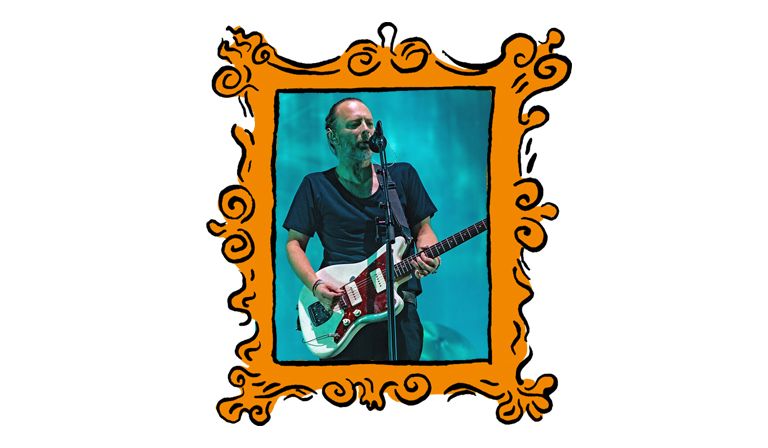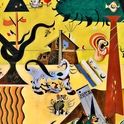The last time I saw the musician Thom Yorke, he was surrounded by a gaggle of naked cyclists. This was not an ambitious publicity stunt, but instead reflected the everyday surreal juxtapositions that living in Oxford—as both Yorke and I do—brings. Yet the incongruous sight of the singer amidst middle-aged bare buttocks belied his reputation for earnest miserabilism, which has dogged him and his band Radiohead ever since their first hit single, 1992’s “Creep”, a visceral hymn to self-loathing that briefly defined them before other, more rewarding, experiments ensued.
For a considerable time, they were the biggest and most popular alternative music act in the world, with their epoch-defining 1997 album OK Computer selling millions of copies; then its experimental successor, 2000’s Kid A, became one of the most debated albums of the millennium. Radiohead were an act that you had to have an opinion about, whether you saw them as the natural successors to Pink Floyd or an over-privileged bunch of noisemakers who eschewed tunes in favour of feedback—or, indeed, both.
Either way, the argument is no longer being waged—at least not vociferously—because Radiohead have now become becalmed, with no new material since their 2016 release A Moon Shaped Pool. They haven’t disbanded, so far as we know. There just haven’t been any songs.
This does not mean that its members are idle, however. That most unlikely of things—a Radiohead expanded universe—now exists, including guitarist Jonny Greenwood’s impressive film compositions; Yorke’s side project, supergroup Atoms for Peace; and drummer Philip Selway’s increasingly distinguished solo albums. Others have been caught in the web, too, ranging from the Hollywood filmmaker Paul Thomas Anderson—who frequently commissions Greenwood to compose scores for his films, including There Will Be Blood (2007) and Phantom Thread (2017), and repays the favour by directing music videos for Radiohead and their offshoots—to the electronic musician Four Tet, who collaborated with both Yorke and Burial on the typically cheery 2020 releases “Her Revolution” and “His Rope”.
Perhaps the most high-profile side project that any of them have been involved with is a group called the Smile—composed of Yorke, Greenwood and the Sons of Kemet drummer Tom Skinner—which has existed since around 2020. Their first album, 2022’s A Light for Attracting Attention, sounded much like the day job, alternating between glitchy, gloomy paranoia and mournful balladeering. Its most accessible song, “Free in the Knowledge”, could easily have graced any latter-day Radiohead album—and probably been acclaimed as a classic to boot.
And now, just last week, the Smile have returned with Wall of Eyes (listen to it on Spotify here), another example of what the publicity terms “post-punk progressive rock with elements of Afrobeat and electronic music”. Crikey. Yet, as one sits down to listen to the album, there is another element that swiftly makes itself noticed: Greenwood’s sumptuously beautiful arrangements, performed by the London Contemporary Orchestra and reminding us that this album has been recorded on a considerable budget.
In fact, Greenwood is surely one of the most interesting avant-garde composers working today. As is the case with the National’s Bryce Dessner, the unlikely but effective union of his classical training and the structural demands of a five-minute rock song makes for fascinating listening. His orchestral arrangements here are shifting tectonic plates of alternately rapturous and bewildering sound. On “Bending Hectic” this results in, halfway through, a terrifying shriek of white noise—something you can easily imagine hearing in The Shining—whereas on “Friend of a Friend” there’s a warped elegance that brings the White Album-era Beatles to mind. It is consistently beguiling.
Then there’s Yorke. The singer may have complained about his “pretty voice” in the past, but now, aged 55, he possesses one of the most distinctive falsettos in modern music—something akin to a wounded choirboy tackling a miserere. Here, it soars and darts around in brilliantly unexpected ways. He sings of how “The ground is coming for me now / We’ve gone over the edge”, but the Smile themselves remain ever airborne.
There’s a warmth and humanity to Wall of Eyes that makes it the most accomplished and—yes—enjoyable album that Yorke and Greenwood have been involved with since Radiohead’s In Rainbows (2007), along with a touch of self-deprecating humour, too. The album’s final track—a meditation on anonymity and isolation—is entitled “You Know Me!”. Perhaps, by now, we do indeed know this most contradictory and bloody-minded of frontmen.
But will Yorke and Greenwood—and, for that matter, their other bandmates—ever return to Radiohead? Who knows? And, for that matter, who cares? The members of Radiohead, together and separately, are still out there expanding their—and our—universe. Some of it’s reminiscent of what they used to do; some of it’s not; almost all of it is thrilling. So let me speak as a fan: we love you, Thom and Jonny, and can only hope that you’ll continue to reciprocate our loyalty in such artistically interesting ways as Wall of Eyes.
Welcome to the Radiohead expanded universe
The music of side-band The Smile is only part of it. But a very good part...
February 01, 2024

© Raph_PH / Wikimedia Commons











